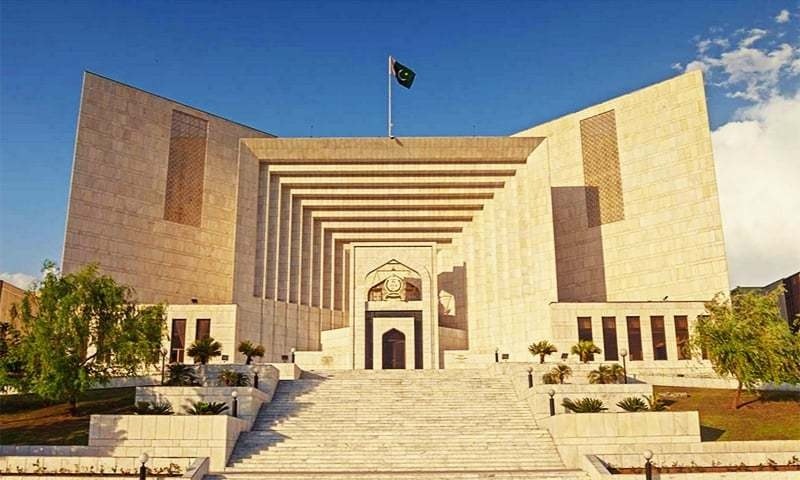ISLAMABAD: The Supreme Court of Pakistan on Wednesday said that the parliament was the appropriate forum to decide whether or not the upcoming Senate elections will be held by open or secret ballot.
A five-member larger bench of the apex court headed by Chief Justice Gulzar Ahmed and comprising Justice Mushir Alam, Justice Umar Ata Bandial, Justice Ijazul Ahsen and Justice Yahya Afridi resumed hearing into the presidential reference seeking upcoming Senate elections through open ballot.
The chief justice said that these were matters that the parliament was supposed to decide, adding that every institution of the country should work under its own jurisdiction and not infringe upon the rights of another.
Concluding his arguments, Senator Raza Rabbani while referring to the Irish Supreme Court judgment, cited earlier by the chief justice, submitted that the Constitution required that nothing could be done that violate the significance of ballot paper secrecy.
“A voter can’t be compelled to disclose his ballot paper so both the secrecy of voter and ballot must be preserved,” Raza Rabbani contended. He further submitted that the ballot is not secret, but once its falls into the hands of the voter, its secrecy begins and exposing the secrecy of voter is unauthorised. “In fact even the state officials can’t see who the voter voted for,” he said.
“Raza Rabbani, we follow the reason but to the extent of election to the National Assembly, the vote of the National Assembly is free, free vote means the freedom of the voter, but for the purpose of Senate, it is not a free vote,” the judge said.
The judge said that the concept of proportional representation demands that the strength of a political party in the provincial assembly must be reflected in the Senate. “Don’t you think that the procedure adopted by the framers of the Constitution will be violated if the constitutional mandate was not followed in letter and spirit,” Justice Ijazul Ahsen asked Raza Rabbani.
Raza Rabbani submitted, no doubt, the provincial strength of the party must be reflected in the Senate, but this is not a matter of mathematics, but politics, and politics is a game of alliances.
Concluding his arguments, Raza Rabbani thanked the court for giving him an opportunity to assist on this important matter. He, however, raised the issue of trichotomy of power. He said that the court is going to give its opinion under advisory jurisdiction of Article 186 of the Constitution as to whether Senate elections are under the Constitution or Election Act and will be interpreting the Constitution.
“We will give our opinion under advisory jurisdiction,” the CJP said. Raza Rabbani said that it must be for the Parliament to decide as to whether elections to the Senate are conducted through open, identifiable or secret ballot and for this purpose a constitutional amendment is needed or a change in the law is required.
“If your lordship comes to the conclusion that these Senate elections are not under the Constitution then the presidential ordinance will come into force,” Raza Rabbani submitted, adding that the term of the presidential ordinance is only for 120 days.
“However, if the Constitution or the law is not amended, it will be said that the Senate elections are held under a temporary law,” Rabbani contended.
“The issue of ordinance is not before us,” the chief justice replied to Raza Rabbani. He asked as to what would be repercussions if the Senate elections are held under the ordinance.
Commencing his arguments, Farooq H Naek, counsel for the PPP, said the MPAs cast their votes in their individual capacity and not in accordance with party list and for this purpose the secrecy of the voter’s ballot paper must be preserved.
Justice Yahya Afridi asked the counsel as to whether he has informed his MPAs that they are free to cast their votes.
“It is for the leadership to decide or issue instructions, while I am just a member of the party,” Naek replied. “But you are appearing before us, representing your party,” Justice Afridi again asked the counsel.
At this, the chief justice while addressing Farooq H Naek remarked that it’s a party that matters, not leadership. “It is not written anywhere that it is going to be on leader’s list as party leaderships have no role in democracy,” the chief justice remarked.
Justice Gulzar Ahmed further said the Constitution talks about party, not leader. Farooq H Naek when said that members are selected on reserved seats, not elected, Justice Ijazul Ahsen asked Naek that the word mentioned in Constitution should not be uttered wrongly. “But it is selection not election,” Farooq Naek repeated, saying the parties provide the list for reserved seats.
The CJP asked Naek if party maintains minutes of meeting taking decision to whom should be voted. Naek replied in the affirmative. He submitted that elections to the Senate are under the Constitution, not under the law. He contended that the presidential reference has raised a political question. He said that as complete procedure has been laid down for the election of president, the same is for the proportional representation under single transferable vote.
At the same time, Naek on a point raised by the court submitted that Parliament regularly votes over different bills, adding that sometimes the members of treasury benches vote for opposition and the opposition benches vote for the treasury benches in a process what he called criss-crossing. Therefore, he said, it is essential that the ballot paper should be kept secret.
Counsels for PML-N also argued before the court citing international treaties. The chief justice observed that they are not deciding any international issues.
Similarly, the JUI counsel Jahangir Jadoon in his arguments submitted that secrecy is the right of the voter. He contended that the matter relating to Article 226 of the Constitution be left to the Parliament.
The chief justice said that they will give their opinion under advisory jurisdiction. The court adjourned the hearing till today (Thursday).



Comments are closed.